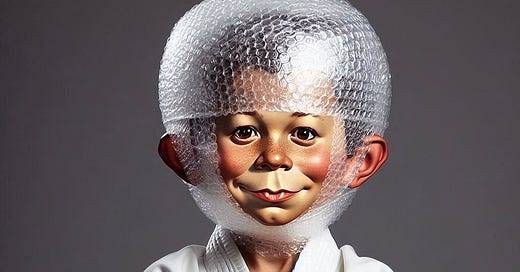Too many knocks on the head.
What recent science has to tell us about brain injury in contact sports.
There has been an ongoing discussion involving scientists, medical people and those with a vested interest in their favoured sporting activity.
The usual suspects; (sports most likely to…)
Boxing.
It might have started with boxing.
If you have any knowledge of the history of the sport at professional level you might be aware of the tragedies of the boxers Michael Watson who suffered catastrophic brain damage in 1991. Or Welsh bantamweight Johnny Owens who died from a dramatic head injury received in the ring in 1980. The debate has continued ever since.
As early as 1949 a British neurologist, Macdonald Critchley wrote a paper called, "Punch-drunk syndromes: the chronic traumatic encephalopathy of boxers", but at that time it was assumed that it was only boxers, and other sports escaped scrutiny.
Football.
Then there was the discussion around professional footballers who suffered accumulated brain damage just through heading the ball. Certainly, from the 1960’s onwards. But, back in those days, the way footballs were designed and the heavyweight leather involved, it’s not surprising. Recent research with historical elite-level players revealed a shocking statistic; that outfield players (not goalkeepers) are 50% more likely to develop dementia than a control sample.
Rugby.
Rugby was the next sport to be put under the microscope. The debate centred around young players, and again, headline-grabbing injuries, broken necks and lesser injuries like concussions were splashed across newspapers.
Martial Arts.
For some reason the oriental-based contact sports seemed to escape the scrutiny, despite in the UK a couple of deaths in the early days of ‘full contact’.
The latest science.
A recent study into contact sports and reported concussions has come to some strange conclusions.
A whole bunch of top-flight universities surveyed 15,000 examples of head injuries, specifically sports-related concussions and said that amateur sports people who suffered concussions while partaking in their favoured contact sports, actually had improved cognitive abilities afterwards. Yes, a knock on the head actually boosts brain power. Or so it seems.
They stayed well clear of the professional sports people, where I suspect their data may have revealed something entirely different.
The theory seems to be that the amateur sportsperson who would admit to being either knocked out or concussed in their sporting lifetime at least once, seemed to suffer no long-term negative effects. The evidence was described as ‘marginal’, but it’s enough to spark a headline in the broadsheets.
It’s really a case of checks and balances; the benefits of long-term sporting engagement pitched against the occasional smack in the head are essentially what it is all about.
To my mind, it stands to reason that if you are the sort of person who is inclined to engage in intense physical activity, coupled with all the social benefits accrued from just getting out and about and living life to the full, you are clearly going to boost your whole physical and mental apparatus. Match that against the Uber-fragility of the world-weary youngster who has no inclination to engage with the world outside their bedroom and for whom the very act of sorting out their dirty laundry is similar to running half a marathon, then it’s a no-brainer.
The research said that those who confessed to have received Sports Related Concussion (SRC) somewhere in their sporting endeavours showed “4.5 percentile rank better working memory than those who had not experienced an SRC, as well as a 7.9% better reasoning capacity than those without concussions”.
Tiny figures, should they be making something of it?
There was a get-out clause; they did wonder what kind of effect damage to the head does on the growing brain – so a return to the junior rugby debate then?
Within women’s MMA you have to wonder about this level of damage though. Although in the following example the big fuss seems to be about the haematoma (technical word for under the skin bleeding AKA bruising). This is Joanna Jedrzejczyk a Polish kickboxer.
But, if you have ever seen a slow-motion film of a fighter taking a punch to the head, it doesn’t take much imagination to figure out that it’s not something you should be taking regularly.
It’s a fact; life is full of knocks and bumps and bruises. When we are kids we all do stupid things and pay the price of broken bones, injuries and permanent scarring. All of them have experiences attached to them and lessons learned (hopefully) and then we move on, slightly more wary and perhaps not too risk-averse as to tip us into major episodes of anxiety.




